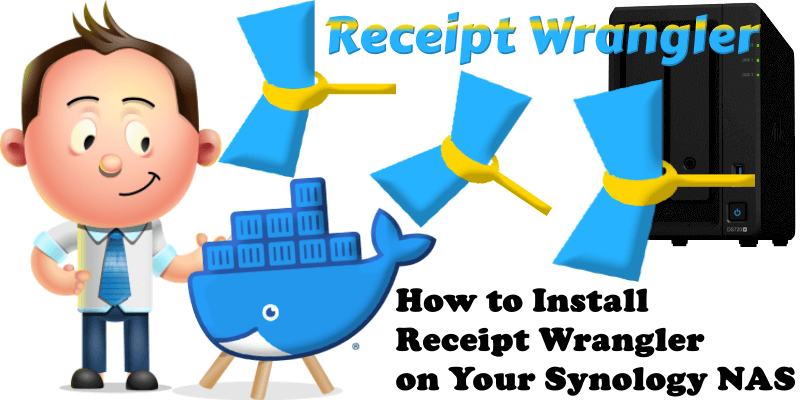
Receipt Wrangler is an easy-to-use self-hosted receipt manager. Receipt Wrangler helps you quickly create receipts with the help of OCR/AI image scanning. Organize receipts for easy filtering. Share receipts and track expenses among multiple users. Upload receipts directly from your email, web app, and mobile app. In this step by step guide I will show you how to install Receipt Wrangler on your Synology NAS using Docker & Portainer.
This guide works perfectly with the latest Receipt Wrangler v6.5.0 release.
STEP 1
Please Support My work by Making a Donation.
STEP 2
Install Portainer using my step by step guide. If you already have Portainer installed on your Synology NAS, skip this STEP. Attention: Make sure you have installed the latest Portainer version.
STEP 3
Go to File Station and open the docker folder. Inside the docker folder, create one new folder and name it receiptwrangler. Follow the instructions in the image below.
Note: Be careful to enter only lowercase, not uppercase letters.
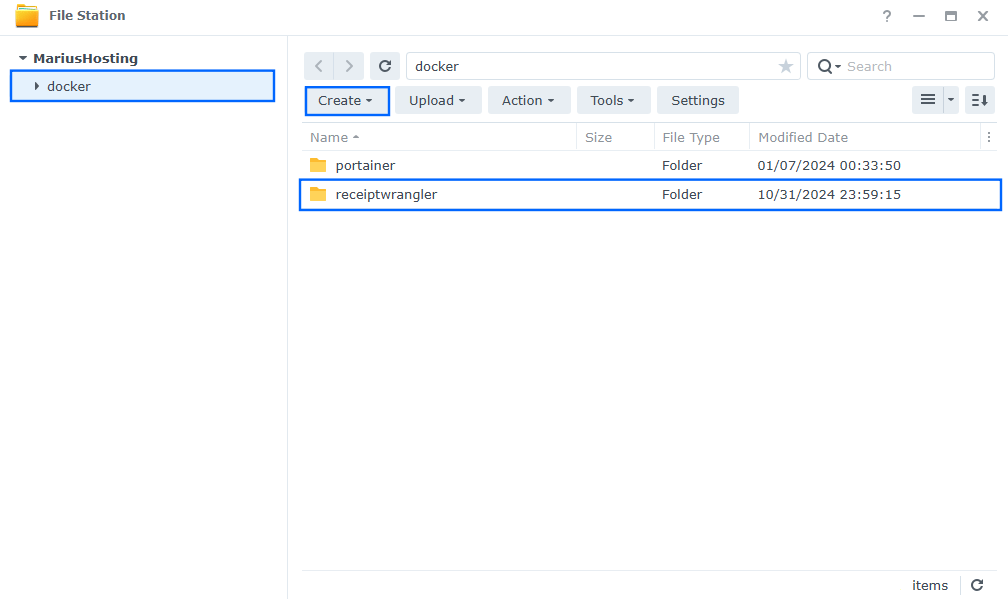
STEP 4
Now create four new folders inside the receiptwrangler folder that you have previously created at STEP 3 and name them data, db, logs, redis. Follow the instructions in the image below.
Note: Be careful to enter only lowercase, not uppercase letters.
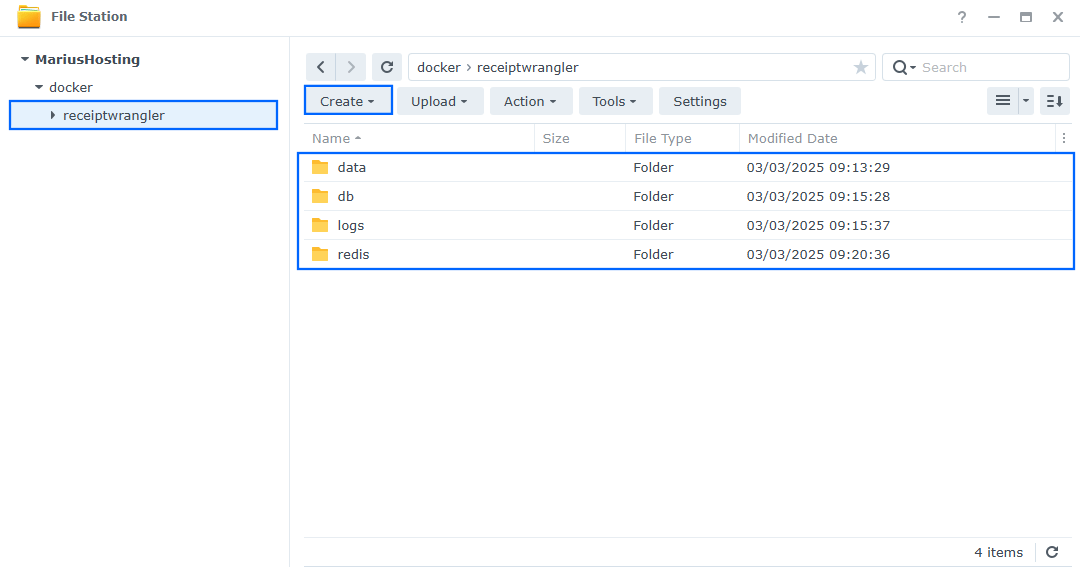
STEP 5
Log into Portainer using your username and password. On the left sidebar in Portainer, click on Home then Live connect. Follow the instructions in the image below.

On the left sidebar in Portainer, click on Stacks then + Add stack. Follow the instructions in the image below.

STEP 6
In the Name field type in receiptwrangler. Follow the instructions in the image below.
services:
db:
image: postgres:17
container_name: Receipt-Wrangler-DB
hostname: wrangler-db
security_opt:
- no-new-privileges:true
healthcheck:
test: ["CMD", "pg_isready", "-q", "-d", "wrangler", "-U", "wrangleruser"]
timeout: 45s
interval: 10s
retries: 10
volumes:
- /volume1/docker/receiptwrangler/db:/var/lib/postgresql/data:rw
environment:
POSTGRES_DB: wrangler
POSTGRES_USER: wrangleruser
POSTGRES_PASSWORD: wranglerpass
restart: on-failure:5
redis:
image: redis
hostname: wrangler-redis
command: redis-server --requirepass redispass
container_name: Receipt-Wrangler-REDIS
user: 1026:100
healthcheck:
test: ["CMD-SHELL", "redis-cli ping || exit 1"]
volumes:
- /volume1/docker/receiptwrangler/redis:/data:rw
environment:
TZ: Europe/Bucharest
restart: on-failure:5
wrangler:
image: noah231515/receipt-wrangler:latest
container_name: Receipt-Wrangler
healthcheck:
test: timeout 10s bash -c ':> /dev/tcp/127.0.0.1/80' || exit 1
interval: 10s
timeout: 5s
retries: 3
start_period: 90s
entrypoint: ./entrypoint.sh
restart: on-failure:5
volumes:
- /volume1/docker/receiptwrangler/data:/app/receipt-wrangler-api/sqlite:rw
- /volume1/docker/receiptwrangler/data:/app/receipt-wrangler-api/data:rw
- /volume1/docker/receiptwrangler/logs:/app/receipt-wrangler-api/logs:rw
environment:
ENCRYPTION_KEY: mariushosting
SECRET_KEY: XaR7SKwPXkU6uC6voLAqKzVWCdFqvmIa
REDIS_PORT: 6379
REDIS_HOST: wrangler-redis
REDIS_PASSWORD: redispass
DB_USER: wrangleruser
DB_PASSWORD: wranglerpass
DB_NAME: wrangler
DB_HOST: db
DB_PORT: 5432
DB_ENGINE: postgresql
depends_on:
db:
condition: service_healthy
redis:
condition: service_healthy
ports:
- 9112:80
Note: Before you paste the code above in the Web editor area below, change the value numbers for user with your own UID and GID values. (Follow my step by step guide on how to do this.) 1026 is my personal UID value and 100 is my personal GID value. You have to type in your own values.
Note: Before you paste the code above in the Web editor area below, change the value for TZ. (Select your current Time Zone from this list.)
Note: Before you paste the code above in the Web editor area below, change the values for ENCRYPTION_KEY. Type in your own username. mariushosting is an example for a username. You should use your own username.
Note: Before you paste the code above in the Web editor area below, change the value for SECRET_KEY. (Generate your own 32 length SECRET_KEY.)
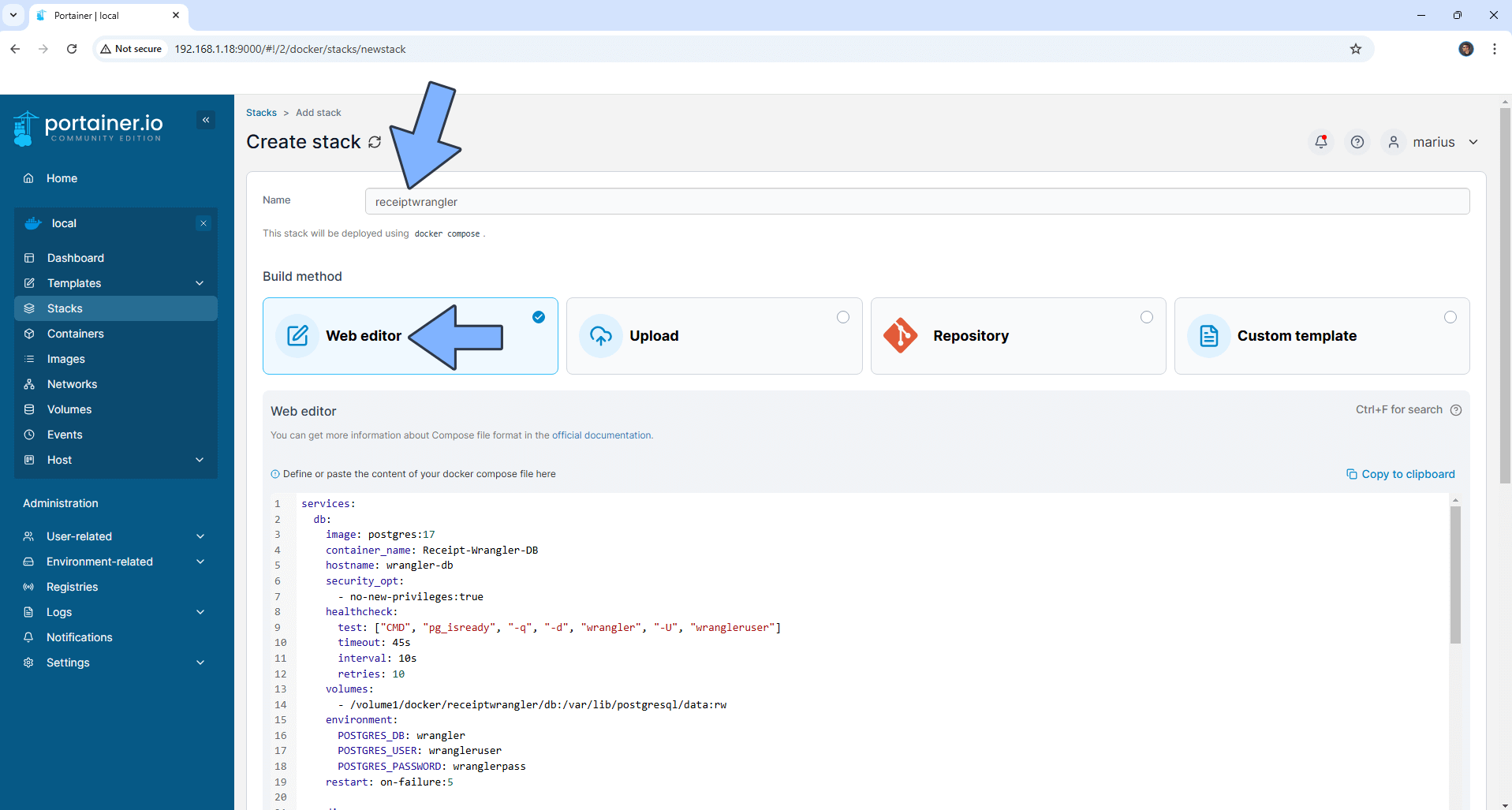
STEP 7
Scroll down on the page until you see a button named Deploy the stack. Click on it. Follow the instructions in the image below. The installation process can take up to a few minutes. It will depend on your Internet speed connection.
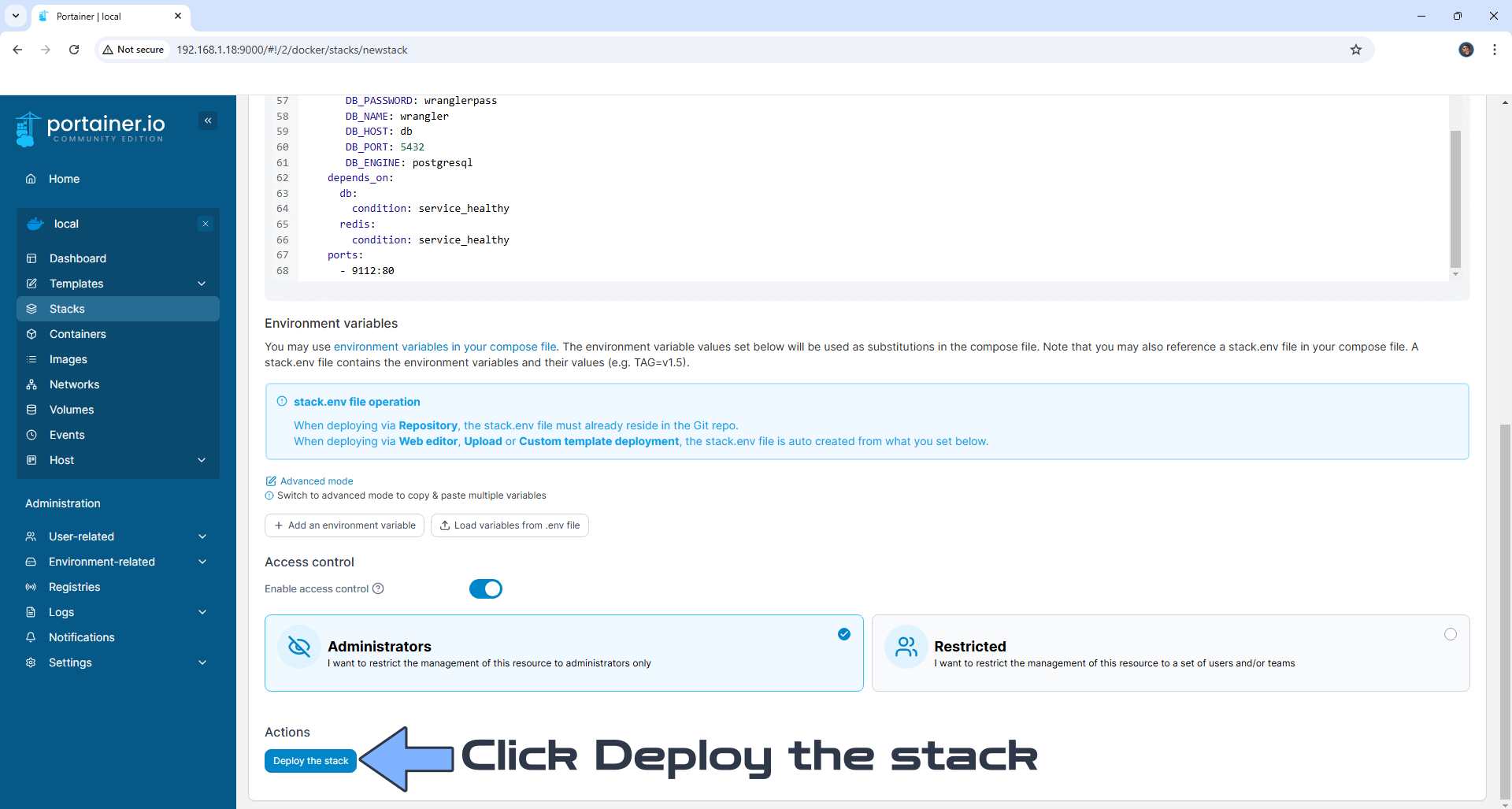
STEP 8
If everything goes right, you will see the following message at the top right of your screen: “Success Stack successfully deployed“.

STEP 9
🟢Please Support My work by Making a Donation. Almost 99,9% of the people that install something using my guides forget to support my work, or just ignore STEP 1. I’ve been very honest about this aspect of my work since the beginning: I don’t run any ADS, I don’t require subscriptions, paid or otherwise, I don’t collect IPs, emails, and I don’t have any referral links from Amazon or other merchants. I also don’t have any POP-UPs or COOKIES. I have repeatedly been told over the years how much I have contributed to the community. It’s something I love doing and have been honest about my passion since the beginning. But I also Need The Community to Support me Back to be able to continue doing this work.
STEP 10
The installation process can take up to a few minutes or less, seconds. It will depend on your Internet speed connection. Now open your browser and type in http://Synology-ip-address:9112 Type in the default Username and Password, then click Login. Follow the instructions in the image below.
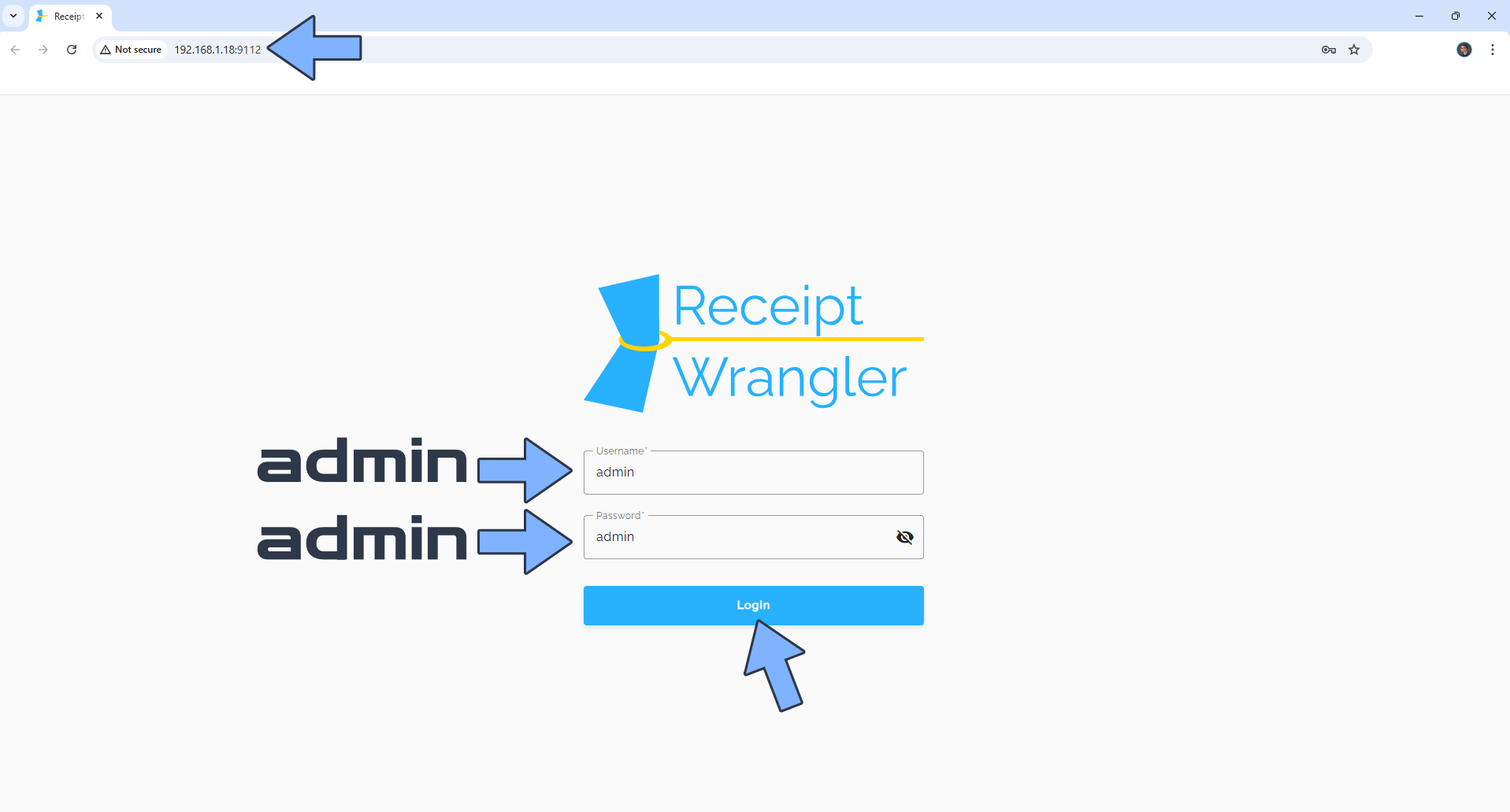
STEP 11
Change the default Username and Password. On the left sidebar, click on the user icon then Manage Users. Edit the username and password. Follow the instructions in the image below.
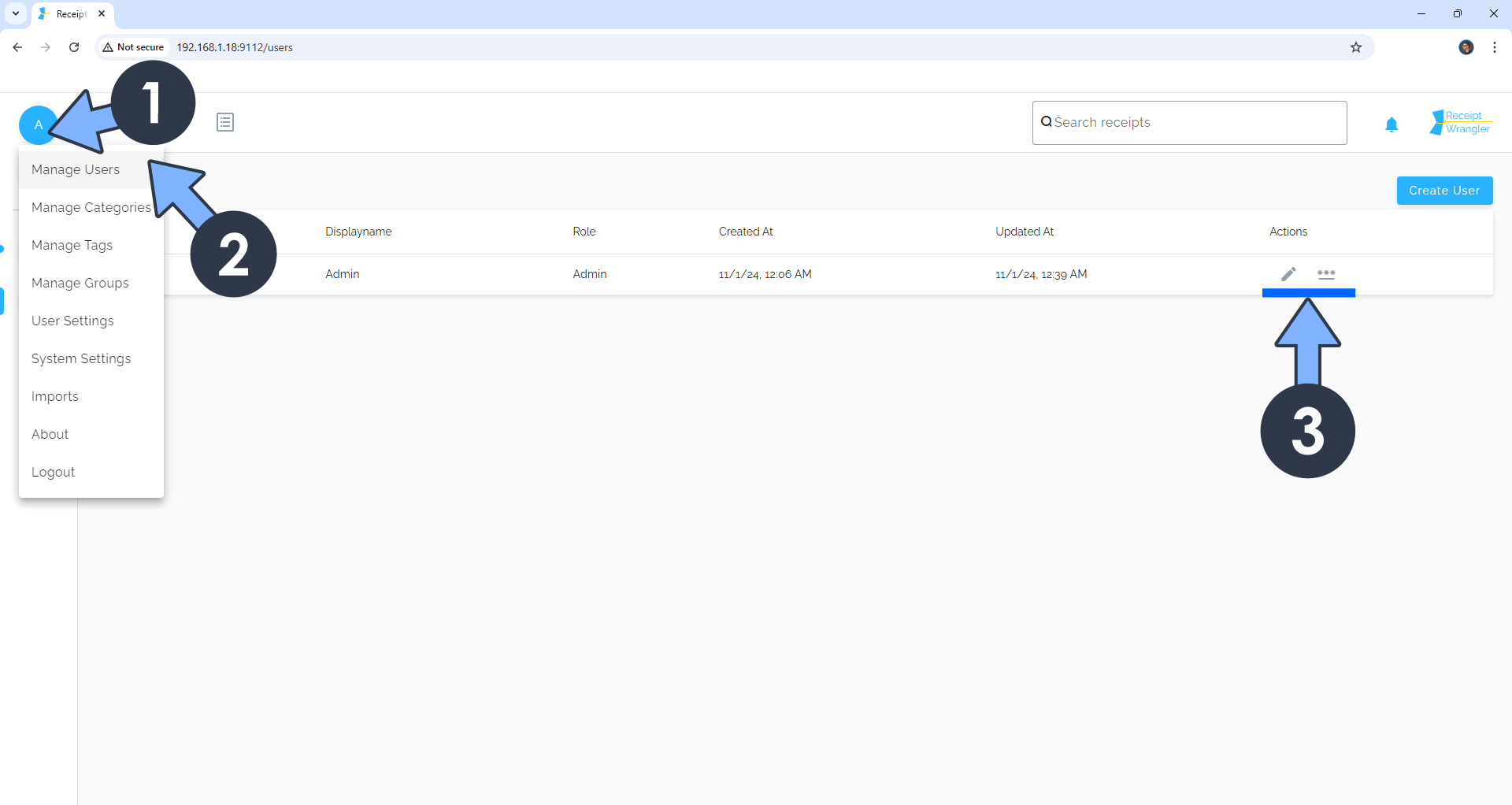
STEP 12
Add your own Receipts. Follow the instructions in the image below.
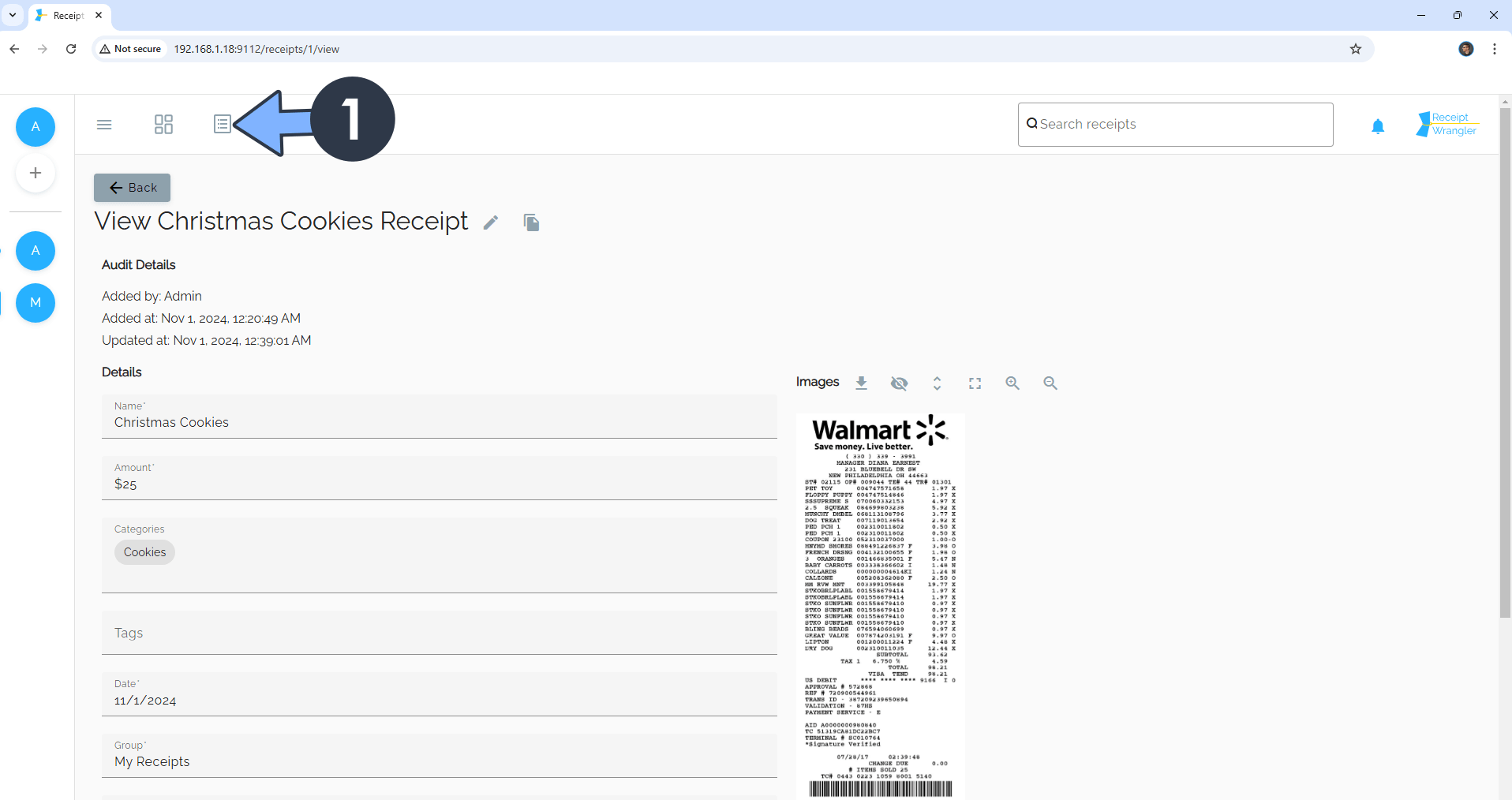
STEP 13
Access the System Settings. Follow the instructions in the image below.
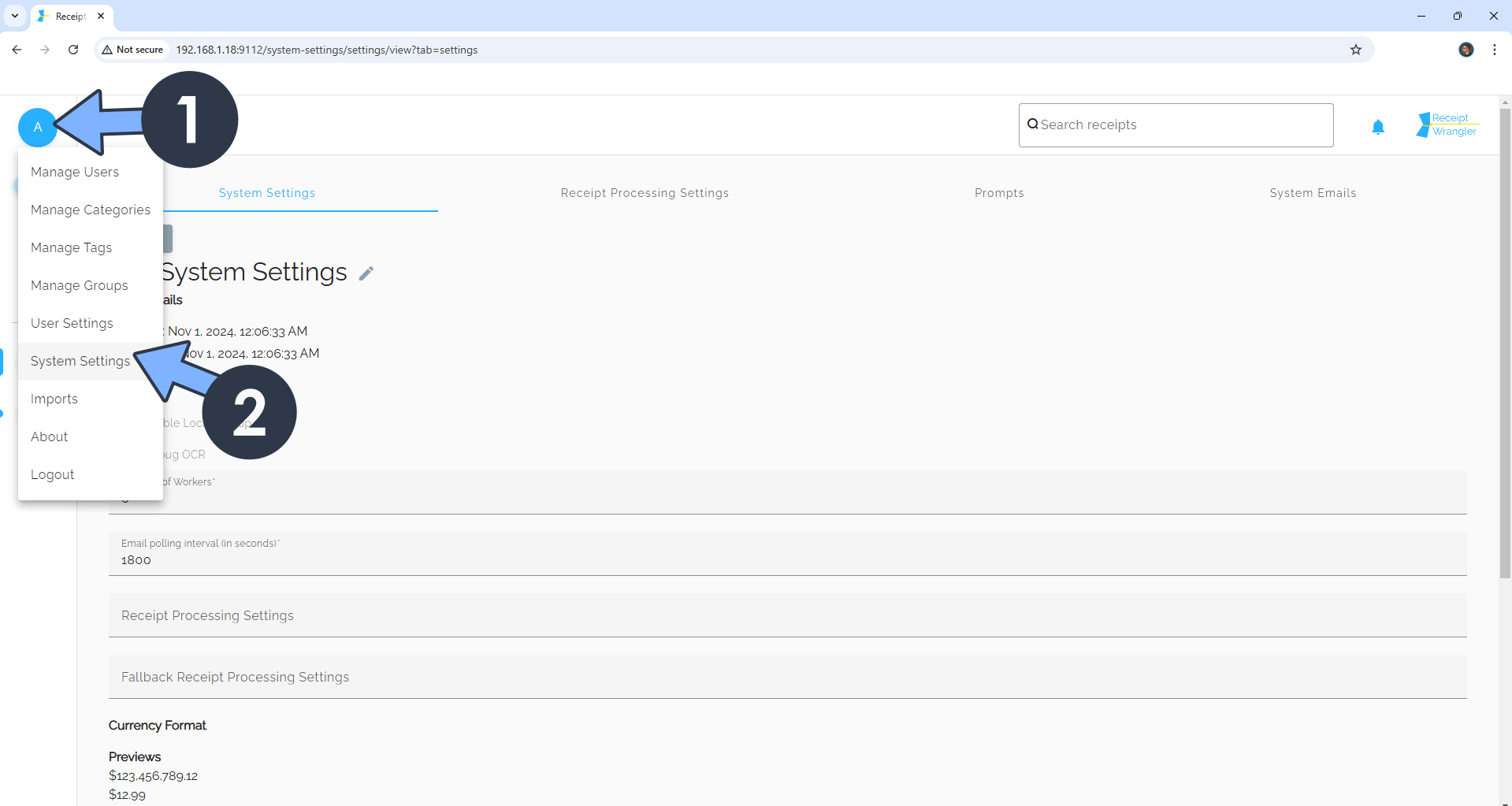
Enjoy Receipt Wrangler!
If you encounter issues by using this container, make sure to check out the Common Docker issues article.
Note: If you want to run the Receipt Wrangler container over HTTPS, check How to Run Docker Containers Over HTTPS. In order to make Receipt Wrangler work via HTTPS, it’s mandatory to activate WebSocket.
Note: Can I run Docker on my Synology NAS? See the supported models.
Note: How to Back Up Docker Containers on your Synology NAS.
Note: Find out how to update the Receipt Wrangler container with the latest image.
Note: How to Free Disk Space on Your NAS if You Run Docker.
Note: How to Schedule Start & Stop For Docker Containers.
Note: How to Activate Email Notifications.
Note: How to Add Access Control Profile on Your NAS.
Note: How to Change Docker Containers Restart Policy.
Note: How to Use Docker Containers With VPN.
Note: Convert Docker Run Into Docker Compose.
Note: How to Clean Docker.
Note: How to Clean Docker Automatically.
Note: Best Practices When Using Docker and DDNS.
Note: Some Docker Containers Need WebSocket.
Note: Find out the Best NAS Models For Docker.
Note: Activate Gmail SMTP For Docker Containers.
This post was updated on Monday / August 25th, 2025 at 6:42 PM
